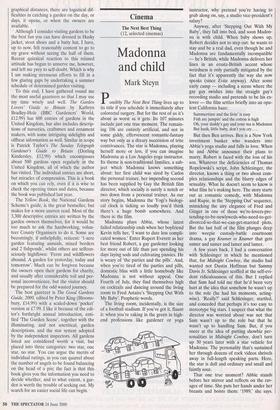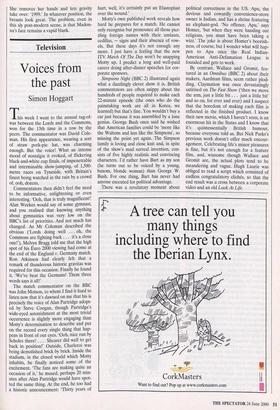Cinema
Madonna and child
Mark Steyn
Possibly The Next Best Thing lives up to its title if you schedule it immediately after colorectal surgery. But for the rest of us it's about as worst as it gets. Its 107 minutes include just one true moment. The remain- ing 106 are entirely artificial, and not in some giddy, effervescent romantic-fantasy way but only as a dreary succession of trite contrivances. The star is Madonna, playing herself more or less, if you can imagine Madonna as a Los Angeles yoga instructor. Its theme is non-traditional families, a sub- ject which Madonna knows something about: her first child was sired by Carlos the personal trainer, her impending second has been supplied by Guy the British film director, which socially is surely a notch or two down from a personal trainer. As our story begins, Madonna the Yogi's biologi- cal clock is ticking so loudly you'd think there's a huge bomb somewhere. And there is: the film.
Madonna plays Abbie, whose latest failed relationship ends when her boyfriend Kevin tells her, 'I want to date less compli- cated women.' Enter Rupert Everett as her best friend Robert, a gay gardener looking for more out of life than just spending his days laying sods and cultivating pansies. He is weary of 'the parties and the pills'. And, when you're tired of the parties and pills, domestic bliss with a little homebody like Madonna is not without appeal. One Fourth of July, they find themselves high on cocktails and dancing around the living room to Fred Astaire's 'Stepping Out With My Baby'. Prophetic words.
The living room, incidentally, is the size of a football stadium. If you've got it, flaunt it: when you're raking in the green in high- end professions like gardener or yoga instructor, why pretend you're having to grub along on, say, a studio vice-president's salary?
Anyway, after 'Stepping Out With My Baby', they fall into bed, and soon Madon- na is with child. When baby shows up, Robert decides not to step out: he wants to stay and be a real dad, even though he and Madonna are fundamentally incompatible — he's British, while Madonna delivers her lines in an ersatz-British accent whose weirdness is only partially mitigated by the fact that it's apparently the way she now speaks (since Evita anyway). After some early camp — including a scene where the gay guy swishes into the straight guy's recording studio and pretends to be his ex- lover — the film settles briefly into an opu- lent. California haze: Summertime and the livin' is easy
Fish are jumpin' and the cotton is high Oh, your daddy's gay and your ma is Madonna But hush, little baby, don't you cry ...
But then Ben arrives. Ben is a New York investment banker who wanders into Abbie's yoga studio and falls in love. When he and Abbic announce their plans to marry, Robert is faced with the loss of his son. Whatever the deficiencies of Thomas Ropelewski's script, John Schlesinger, the director, knows a thing or two about com- plex relationships and the blurry edges of sexuality. What he doesn't seem to know is what film he's making here. The story starts out as romantic comedy, with Madonna and Rupie, in the 'Stepping Out' sequence, mimicking the airy elegance of Fred and Ginger in one of those we're-lovers-pre- tending-to-be-newlyweds-who-need-to-get- divorced-so-that-we-can-get-married plots. But the last half of the film plunges deep into weepie custody-battle courtroom drama, a gay Kramer vs Kramer that gets samer and samer and lamer and lamer.
A few years back, I had a conversation with Schlesinger in which he mentioned that, for Midnight Cowboy, the studio had wanted not Dustin Hoffman but Sammy Davis Jr. Schlesinger scoffed at the self-evi- dent ridiculousness of this. But I replied that Sam had told me that he'd been very hurt at the idea that somehow he wasn't up to the role (he had his moments, acting- wise). 'Really?' said Schlesinger, startled, and conceded that perhaps it's too easy to stereotype big stars. I suspect that what the director was worried about was not that Sam wasn't up to the role but that he wasn't up to handling Sam. But, if you sneer at the idea of putting showbiz per- sonalities in Midnight Cowboy, don't turn up 30 years later with a star vehicle for Madonna. The personality that's sustained her through dozens of rock videos shrivels away in full-length speaking parts. Here, the star is dull and ordinary and small and faintly sour.
That one true moment? Abbie stands before her mirror and reflects on the rav- ages of time. She puts her hands under her breasts and hoists them: '1989; she says. She removes her hands and lets gravity take over: '1999? In whatever position, the breasts look great. The problem, even in this sly post-modern scene, is that Madon- na's face remains a vapid blank.



































































 Previous page
Previous page